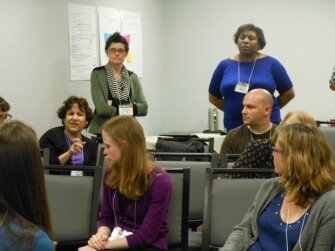At the American Educational Research Association conference this week, I ran a workshop with colleagues from around the country (Betsy DiSalvo, Mark Chen, Katie Davis, Nettrice Gaskins) on Understanding Digital Inequalities. We spent 90 minutes with scholars from all over the country examining our evolving understanding of the digital divide.
In my opening comments at the workshop, I argued that the “Digital Divide” might be better framed as a “Digital Fault Line,” where new inequalities open and close as the landscape of technology and economic inequality shifts beneath us. Understanding the digital divide simply as “equal access to technology” ignores how different cultural and economic groups use technology differently. Betsy DiSalvo, for instance, examines differences in cultural relationships with computation, noting that consuming computation (playing games), producing with computation (blogging, tweeting), and producing computation itself (programming, modding) are experienced by different groups in different ways. Young African-American males are disproportionately likely to be consumers of computation and are underrepresented as producers of computation, and her doctoral work with the Glitch Game Testers represents a promising pathway for addressing these inequities.

The workshop format that we used was an experiment in several ways. Rather than reading papers or giving talks (which was useful when academic conferences were established in the early 20th century, but not so much now), we gave short provocations and then conducted several exercises to crowdsource insights and examine evolving features of the digital divide. We also promised to produce a “flash publication” by week’s end, documenting our insights and reflections. So over this weekend and next week, I’ll be sharing several pieces written by the workshop team.
As a preface, I wanted to share two excellent recent reports that provide a broader context on our contemporary understanding of economic inequality and educational outcomes.
The first piece is an article by Sean Reardon of Stanford University called The Widening Income Achievement Gap, published in this months Educational Leadership. The article begins: “If we do not find ways to reduce the growing inequality in education outcomes--between the rich and the poor--schools will no longer be the great equalizer we want them to be.” In particular, Reardon notes that while racial achievement gaps remain of serious concern, these gaps have decreased over the last six decades, while income-based achievement gaps have widened. These tectonic shifts in our baseline understanding of economic equality frame the shifting divides along the digital fault line.

The second framing piece is an outstanding address recently given by Uri Treisman at the National Council of Teachers of Mathematics annual meeting. Treisman’s talk, Keeping Our Eyes on the Prize, is fueled by a deep passion for educational equality, even as his approach is rich in data, analysis, and nuance. Treisman argues that “the accident of birth or the accident of where you live should not be the primary determinant of your educational opportunities.” In particular, Treisman provides a detailed analysis of the “American schools are failing” trope, and uses data from international tests like PISA and TIMSS, as well as data from his home state of Texas and other places, to demonstrate that American schools are not fundamentally broken, but that the American system of schooling is fundamentally inequitable.
It’s 50 of the best minutes that you can spend to get a detailed examination of educational inequality in American. My favorite line, “Poverty is something we need to work on as citizens. Opportunity to learn is something we need to work on as math educators.” The talk is below, and the slides are available here.
Stay tuned next week, and we’ll build upon these baseline insights into educational inequality to continue to explore evolving digital fault lines.
For regular updates, follow me on Twitter at @bjfr and for my publications, C.V., and online portfolio, visit EdTechResearcher.



